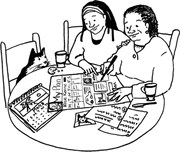Seven steps to being in control of your support
Step 1: Your money - finding out how much
The first thing to do is to find out if you can get money for your support - and how much.

The money you get to spend on your support is called your personal budget.
To find out how much money you can get, you have to have an assessment.
For more information see our fact sheet on getting started with an assessment.
Step 2: Making your support plan
The second thing is to make a plan about how you'll use the money to get the life you want. You can do the plan yourself, or you can get help.
When you make your plan, think about:
- what works and doesn't work in your life at the moment
- what is important to you and what you want to do
- what support you want
- ideas about how to make these things happen
- what would keep you healthy, safe and well

You can get help from:
- a friend
- someone in your family
- your care manager
- a social worker
- someone who supports you now
- a broker: a broker is someone who you pay to help plan and sort out your support
We have also developed a fact sheet on support planning
Step 3: Getting your plan agreed
A care manager or social worker from your council has to say your plan is OK before you get your personal budget.

Your personal budget is the money you get for support.
Your plan must answer these questions:
- What is important to you?
- What do you want to change?
- How will you spend your money?
- How will you manage your support?
- How will you stay in control?
- What will you do next?
We have written a fact sheet on getting your plan agreed.
Step 4: Organising your money
When your social worker agrees your plan, you get your personal budget. You can get the money yourself as a direct payment, you can choose someone to look after the money for you or you can do a bit of both.

There are two ways to look after the money:
- you can get the money yourself as a direct payment
- you can choose someone to look after the money for you
....You can even do a bit of both.
The Mental Capacity Act says that some people need a Deputy or an Attorney. You can find out more about these from the Office of the Public Guardian: 0845 330 2900.
We have written a fact sheet on organising your money.
Step 5: Organising your support
You can organise your support in a way that suits you. You can get help to find and organise support.

You can choose how much help you get to sort out your support. People who can help are:
- a friend or someone in your family
- a broker - someone you pay to help you
- a Trust - a group of people who the law says can look after your money for you
- a Deputy or Attorney (under the Mental Capacity Act)
- a service provider or organisation (a group of people who run services) that will look after your money
- your social worker
We have developed a fact sheet on organising your support
Step 6: Living your life
You can use services but you can also spend your money on people who you know - or even buy things that will help you in your life. This is about living your life your way.

There are things most people want in life - things like:
- a nice place to live
- feeling safe
- having fun in your spare time
- a job or something interesting to do in the day
- being part of your community
- friends
- having a holiday
If you have a personal budget you can use it to meet the needs in your assessment to get the life you want.
Step 7: Seeing how it worked
You have to show that you have used the money properly. You should meet with your social worker about once a year to see how things are going. But you can ask for a meeting any time.

Your social worker needs to know how your plan is working and how you are spending the money.
Also, you can help other people organise their support: tell them what worked and what didn't work for you. If you want to tell people about how things worked for you, we could put it on the website. Let us know.
Seven steps to being in control
More information on each step and our Easy Read 'Seven steps to being in control' poster can be downloaded below.
The seven steps poster can be downloaded here
Seven steps to being in control
Follow these seven steps to be in control of your life:

